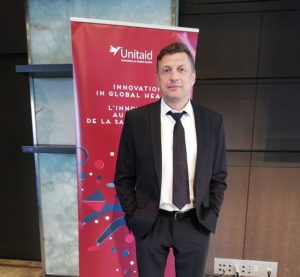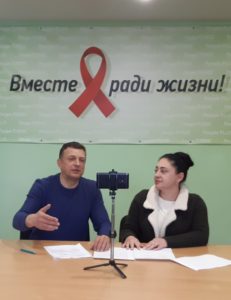Anatoly Leshenok, Deputy Chairman of the Board of the Association People PLUS (Belarus) talks about activities of his organization and increasing computer literacy at COVID-19 time.
For reference
The activities of the People PLUS Association are aimed at supporting people living with HIV and their families in Belarus. The organisation provides clients with comprehensive informational, social, psychological, legal and otherwise necessary assistance. People PLUS is working to improve the quality of social and medical services provided to HIV-positive people, including improving access to innovative and modern medicines for treating HIV infection, tuberculosis and hepatitis C.
Difficulties related to COVID-19
Despite the significant number of COVID-19 cases in Belarus, neither quarantine measures nor a state of emergency have been introduced. In order to avoid exposing clients to the additional risks of infection with the coronavirus, we have moved the majority of our activities online.
These days, the main problem faced by people living with HIV in Belarus is the disruption in the supply of ARV treatment — containing Tenofovir / Emtricitabine / Efavirenz. People cannot get medication for a longer treatment period, as is recommended. In some regions, they have to go to medical facilities every 10 days to get treatment, in others, treatment plans for patients were changed due to these disruptions.
The lack of access to antiretroviral therapy is also faced by Belarusian citizens staying abroad under quarantine. The organisations Life4me and EWNA help them to get ARV medication in the country of residence and they receive packages with medicaments sent from Belarus as well.
Together with our partners from GNP +, Life4me and EATG, we looked into the reasons for the disruption in ARV supplies. We discovered that in December 2019 the production of ingredients used to produce the medication was suspended in China due to Covid–19. Later, India introduced lockdown measures that similarly slowed down production.
The company selling the medication in Belarus was notified of the delivery delays, but did not take any measures to prevent a shortage. Therefore, our association informed the Ministry of Health of the Republic of Belarus about the results of our monitoring of the procurement situation. The reaction of the Ministry was the announcement on April 10 of an emergency purchase of a 3-month volume of ARVs – medicine containing tenofovir.
At the same time, we were in touch with pharmaceutical companies, exploring the possibility of an emergency supply of necessary medicines to Belarus in the context of the disruptions in logistics caused by Covid-19. Companies that did not register medications in Belarus, but did have a WHO prequalification or were registered in ICH countries, could also participate in the competition. At this time, the Mylan company, which won the competition, has already delivered medicines to Belarus. They were cleared by custom services, and permission is received from the Center for Expertise on Importation.
Innovations
The People PLUS Association, together with UNAIDS, once conducted an online survey entitled “Assessing the Needs of People Living with HIV in Belarus in the Context of Coronavirus”. During this survey, it turned out that many PLHIV were not able to fill out the questionnaires on their own and had to call in the help of peer consultants.
And, as it turned out, many of our activists do not have sufficient proficiency in the usage of computer programs and applications either.
For this reason, UNAIDS has begun supplying our organisation with IT-classes for conferences, surveys, etc. Also, we are planning to equip a computer classroom for teaching computer literacy, starting with the basics. Such training is necessary primarily for the elderly, as well as those who have been released after a long period of imprisonment.
Belarus counts around 600 people living with HIV over the age of 60. For them, the ability to use Internet resources will be of much help. They will get access to necessary information, as well as to the website www.hiv.by, our Facebook groups facebook.com/groups/peopleplus.by and instagram.com/people_plus.by, which will in turn contribute to improving commitment to continue ART. The possibility to communicate with relatives and friends living far away through social networks will help to improve the psycho-emotional state of PLHIV.
In other words, the changes brought by the coronavirus pandemic requires the adaptation of traditional working methods. To make our work in improving the commitment to ARV therapy more efficient, we want to shoot videos on various topics that will be used in the work of equal consultants with their clients. These videos will be part of the online commitment trainings that will be available, also for PLHIV in prisons.





